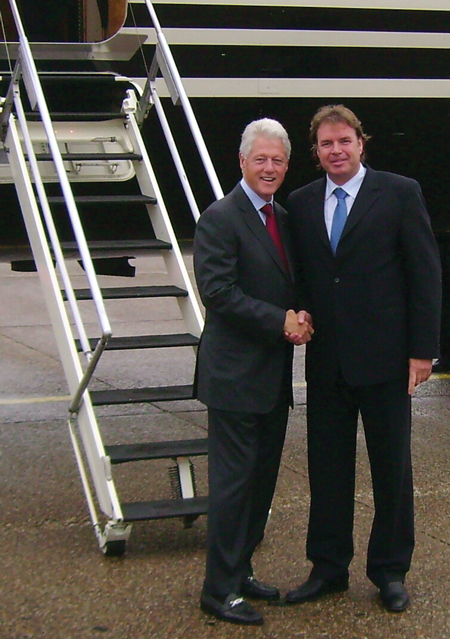25 Years of ETS: Serving the Netherlands for Two Generations
- Details
BY MADELEINE MACCAR
 CEO Bart van Leijden (center) with his sons Event/International Manager Nick van Leijden (left) and Dispatcher John van Leijden in front of their office in the Netherlands One car, one client, one chauffeur: It’s a recipe familiar to any operator who has undertaken the daunting task of breaking into luxury ground transportation one milestone at a time. And 25 years ago this past August, it was a similar story for Bart van Leijden when he took the auspicious advice of a neighbor who ran a taxi company and suggested that driving cabs might be right up van Leijden’s alley.
CEO Bart van Leijden (center) with his sons Event/International Manager Nick van Leijden (left) and Dispatcher John van Leijden in front of their office in the Netherlands One car, one client, one chauffeur: It’s a recipe familiar to any operator who has undertaken the daunting task of breaking into luxury ground transportation one milestone at a time. And 25 years ago this past August, it was a similar story for Bart van Leijden when he took the auspicious advice of a neighbor who ran a taxi company and suggested that driving cabs might be right up van Leijden’s alley.
The future CEO of the Dutch ETS Executive & VIP Transport then quickly realized that he did, indeed, enjoying driving passengers—though perhaps just not in a taxicab.
“If I wanted to continue with this profession, I knew I was going to have to buy a beautiful car and build a business based on corporate travelers,” he says.
And van Leijden did just that, as well as immediately began courting Rotterdam’s only five-star hotel, The Westin, which is now The Rotterdam Marriott Hotel—and still an ETS client. Securing that job quickly led to work from the Ministry of Foreign Affairs—like chauffeuring the Italian president at the time—and other government transportation, all leading to the necessity of acquiring more vehicles and hiring more staff, starting with his brother-in-law.
As ETS has since grown to include three offices—one in the Czech Republic capital of Prague, one in Brussels, and one right between the Dutch cities of Amsterdam and Rotterdam—with 18 late-model vehicles: sedans like the Mercedes-Benz E-Class and BMW 5 Series, Mercedes S-Class, BMW 7 Series, BMW X5 SUV, and both an 8- and 15-seat Sprinter. The Mercedes E S-Class and BMW 7 Series are the company’s two most in-demand vehicles, which van Leijden attributes to their respective brands making “just really nice cars.”
Comprising a staff fluent in English, French, and Dutch are 6 office employees, and a pool of drivers: 10 full-time ETS chauffeurs and another 40 from a driver corporation—essentially full-time IOs who work exclusively for ETS.
 The unique architecture of Amsterdam abuts its famous canals It is no secret that running a transportation operation in Europe can be more difficult than it is in the United States, as taxes are staggeringly high (van Leijden reports paying a 52-percent tax after profits) and regulations are stringent if not outright binding. Among those especially daunting hurdles are strict restrictions placed upon chauffeurs that make juggling their schedules a significant logistical challenge, and can carry a hefty fine if even just inadvertently fumbled.
The unique architecture of Amsterdam abuts its famous canals It is no secret that running a transportation operation in Europe can be more difficult than it is in the United States, as taxes are staggeringly high (van Leijden reports paying a 52-percent tax after profits) and regulations are stringent if not outright binding. Among those especially daunting hurdles are strict restrictions placed upon chauffeurs that make juggling their schedules a significant logistical challenge, and can carry a hefty fine if even just inadvertently fumbled.
“The government makes it hard for limousine companies to operate here,” van Leijden says. “My chauffeurs are only allowed to drive 10 hours; if you use someone from a corporation, they are allowed to drive 12 or 14 hours. We have a small computer in the car, and at the start of a job, we have to turn on the computer and it registers everything: where you stop, how long you’re driving, what time did you rest, what time did you finish—everything. The police check this every week. If you don’t do this correctly, then they give you really big, big penalties—penalties up to $5,000 per offense.”
Van Leijden himself will occasionally get behind the wheel when time allows, or if a particularly well-regarded client asks for him specifically. As ETS has a knack for retaining clients, individual passengers and corporate accounts who have been loyal to the company since its early days grew accustomed to those first four or five years of the business when van Leijden was their primary chauffeur, and he is loath to disappoint them.
“I still drive! I have a few clients who always ask for me: Even if it’s a job for five miles, I pick them up myself because I love to deal with my oldest clients,” he says. “I love driving. As CEO, of course I have other things to do, but it’s also important to be in the midst of the chauffeurs because then you can keep an eye on them, too.”
ETS’s rigorous training program includes two months of being mentored by van Leijden and shadowing ETS’s most experienced chauffeur Ed van Dam—a 20-year company veteran whose frank appraisal of potential hires van Leijden has come to depend upon. The prospective chauffuer then takes to the roads by himself for another month of on-the-road training. The CEO can admit with a laugh that those he entrusts with his cars and clients are “maybe almost better drivers than me” thanks to ETS’s training.
 ETS’s office staff includes (L to R) Celine Wong in Accounting and Dispatcher Jordy Bunschoten, pictured here with Michael Kaptein and Patrick Fortuin “I prefer to hire somebody who has had nothing to do with the business. The reason is, you can teach them everything—experienced drivers always think that they know better than you,” he says. “We need our drivers at 100 percent, no less.”
ETS’s office staff includes (L to R) Celine Wong in Accounting and Dispatcher Jordy Bunschoten, pictured here with Michael Kaptein and Patrick Fortuin “I prefer to hire somebody who has had nothing to do with the business. The reason is, you can teach them everything—experienced drivers always think that they know better than you,” he says. “We need our drivers at 100 percent, no less.”
And with a whole range of difficulties particular to the region that ETS serves—mostly concentrated in the Netherlands’ major cities but also crossing national borders into Luxembourg, Brussels, and occassionaly Germany—van Leijden has good reason to exercise caution with every new chauffeur he considers.
A small, densely populated country situated in Western Europe, the Netherlands attracts both international tourists and corporate travelers in droves. Its rich history extends mind-bogglingly into the past: The nation declared its independence from Spain in 1581, though it’s supported a consistently human population since at least the Stone Age.
Vestiges of the country’s comparatively more recent history are everywhere, especially in Amsterdam, the nation’s capital city and a wildly popular destination. While Rotterdam is a thoroughly modern metropolis that boasts roads able to comfortably accommodate today’s vehicles—like motorcoaches—Amsterdam’s terrain is punctuated by bridges, canals that were planned with the early 17th century’s immigration boom in mind, narrow roads, and an iconic, breathtaking skyline. The city’s oldest building, Oude Kerk (literally “Old Church”), has stood watch over the city since 1306, and the architecture that’s risen up around it ranges from the long-ago Gothic to Amsterdam’s own take on the Art Deco style made famous in the early 20th century.
Operating in such a historic locale presents a number of unique challenges: One-way streets and heavy traffic from both bicyclists and pedestrians are obstacles enough (van Leijden had to enforce a rule preventing his cars’ left doors from being opened by anyone other than a keenly attentive chauffeur, as too many cyclists were getting hit with them), but large vehicles are not allowed on its streets—all big groups going through Amsterdam must be transported via Mercedes-Benz Sprinters or its V-Class vans. What’s more, van Leijden says that when making reservations, time management is crucial to account for the possibility of sudden traffic blockages in the city like garbage trucks, which can have a car stuck in immobilized limbo for far too long.
 Bart van Leijden with passenger and former U.S. President Bill Clinton And while the Netherlands enjoys both summers and winters that are generally mild, an especially brutal winter is a straight-up nightmare to be met with caution and determination in equal measures.
Bart van Leijden with passenger and former U.S. President Bill Clinton And while the Netherlands enjoys both summers and winters that are generally mild, an especially brutal winter is a straight-up nightmare to be met with caution and determination in equal measures.
“There are a lot of small bridges in Amsterdam, and in a quite hard winter like last year’s, there was so much ice on the road that we couldn’t go over the bridges,” van Leijden says. “We need special winter tires, and then you cross your fingers that you can make it because you have no choice. It’s all one-way, so you’re in the water if you’re not careful.”
But modern-day Netherlands is also home to a thriving financial district where investment companies also have headquarters—and so ETS has always tailored its services to meet the needs of the ultra-high-end corporate clientele who comprise the majority of its customers, wholly cognizant of that extra layer of market-specific precautions needed to ensure everyone gets to their destination safely and on time. van Leijden is adamant about always delivering the same impeccable service to everyone who enters one of his vehicles.
In addition to Amsterdam and Rotterdam and their respective airports, trips to and from The Hague are a significant source of work for ETS. The city is the seat of the kingdom’s government, and is home to the likes of Parliament, the Noordeinde Palace, International Court of Justice, and most of the county’s foreign embassies. Also take into account the world-class yachts that are manufactured in the country (which can fetch up to €200M) and its incredible art scene, and you’ll start to get an idea of how varied van Leijden’s clients are and how well-choreographed his business is.
“People come here because it is very important not only for investments and the financial district, but a lot rich people come to also buy their yachts,” he explains. “And we have also the most interesting arts fair, Tefaf, which attracts famous people like Meryl Streep and Brad Pitt. It’s in a little tiny city called Maastricht, and it’s so small that there are no local limousine companies. So you can imagine it: We have to bring all of our fleet over from Amsterdam, Rotterdam, and The Hague, all to the little town of Maastricht to serve our clients. Then we have about 35 or 40 cars constantly running between Tefaf and the airport and hotels.”
 Bart van Leijden and one of ETS’s BMWs in front of The Royal Palace of Amsterdam Artists do, indeed, flock to areas like Amsterdam—and so, too, do musical artists. One of the logistics van Leijden has to juggle is when to send his most seasoned chauffeurs to present an image of the utmost integrity and when to send younger ones who can appeal to the hip-hop and rap personalities ETS transports on coffee-shop excursions.
Bart van Leijden and one of ETS’s BMWs in front of The Royal Palace of Amsterdam Artists do, indeed, flock to areas like Amsterdam—and so, too, do musical artists. One of the logistics van Leijden has to juggle is when to send his most seasoned chauffeurs to present an image of the utmost integrity and when to send younger ones who can appeal to the hip-hop and rap personalities ETS transports on coffee-shop excursions.
While transporting celebrities is old hat to the ETS team, van Leijden is still proud that instantly recognizable names from the musical and performing arts and international politics have all been driven by his chauffeurs. This is a true feather in the proverbial cap of a company that prides itself on aiming high to attract discerning clients rather than scrambling to pick up too many jobs at the risk of damaging its reputation.
“The reason why I’m among those at the top of the market is because I don’t want to work for everyone,” says van Leijden. “That’s the big mistake some companies make: They take on every client but they can’t handle the work, so they farm it out to others who destroy the job—and then they lose their good name. And I don’t want this. I want only the business I can control. And in this business, you only can survive if you control everything.”
Keeping a tight lid on things in a business where you’re forever at odds with unpredictable circumstances is no easy task, which is why it was of the utmost importance to van Leijden that he not only hire people he trusted were up to the task but also stock his fleet strategically.
ETS is truly a family affair, as van Leijden’s brother-in-law still drives for the company and has since been joined in the role by a cousin. His nephew works as a dispatcher, and his own two sons have ventured into the company their father has built from the ground up, one piece at a time. Nick joined first four years ago and is now working as the event manager. He frequently represents ETS across the world, taking care of events for Nike, Coca-Cola, and Heineken in countries like Germany, Italy, Turkey, Spain, and Denmark.
I was a little afraid because when you start a company, you one day can sell it or you can close it—but now I have two sons in the business and they love their jobs. That’s very important to me.” – Bart van Leijden, CEO of ETS Executive & VIP Transport
A newly minted university graduate, John has recently decided to join the family company—and van Leijden insists that he, too, must work his way through the ranks.
“John started as a dispatcher, and on the weekends he is now able to drive people. I’d like to get him to grow into the company from the bottom—he had to start there,” he says, unmistakably pleased that both sons have chosen to make ETS a second-generation undertaking, as the future of his company matters a great deal to him. “I was a little afraid because when you start a company, you one day can sell it or you can close it—but now I have two sons in the business and they love their jobs. That’s very important to me.”
It is a source of both relief and honor for van Leijden that his sons have chosen to work at ETS. Nick had gravitated right to the company; John, however, was a little more hesitant to follow in their footsteps but, according to van Leijden, has since come to enjoy the work.
“I encouraged my sons to work with me,” he says. “I’m fortunate, and I’m proud that the company I started and our name will continue. It makes me happy.”
 Bart van Leijden and his wife Danielle The ETS team itself is a family in its own right: van Leijden says that he has had exactly one employee part ways with his company in its 25 years, and that was on account of moving to a different country. Among that family is Office Manager Dominick Grootscholten, who came to the company six years ago with prior industry experience, and who van Leijden says makes sure all of the vehicles are in operational order and is the crucial conduit between dispatch and chauffeurs.
Bart van Leijden and his wife Danielle The ETS team itself is a family in its own right: van Leijden says that he has had exactly one employee part ways with his company in its 25 years, and that was on account of moving to a different country. Among that family is Office Manager Dominick Grootscholten, who came to the company six years ago with prior industry experience, and who van Leijden says makes sure all of the vehicles are in operational order and is the crucial conduit between dispatch and chauffeurs.
And just as carefully as he outfitted his fleet and staffed his operation, van Leijden was similarly cautions when he decided to start working with international affiliates. Tristar London was the first company to start using ETS’s services and others quickly followed, like Europe’s NetJets, which operates in both the Netherlands and Belgium. Having the double obligation of living up to two companies’ reputations whenever he fields affiliate work is not a responsibility van Leijden takes either lightly or for granted.
“With this kind of client, you need to be the toppest of top—otherwise they will use different companies,” he says. “A car is a car, but if you have a bad chauffeur then it won’t be a good service. So we train our own drivers. All of them are screened and tested every six months; in fact, we do background checks anyway because we do a lot of work for the government, so we have to have the best chauffeurs.”
It is, after all, an industry where van Leijden clearly feels at home, and revels in the opportunity to give his passengers the best service possible. And even though the nature of the work is demanding, the time he gets with his wife Danielle, dogs, and sons on the golf course rather than the office balances out the long days spent invested in ETS, his team, and his clients.
While van Leijden jokes about maybe choosing another line of work, he is quick to add that he enjoys the world of luxury ground transportation too much. He finds that there is something especially rewarding in knowing that a client is happy—and never is it more clear than when they leave not so much feedback but rather a request: “We always teach our chauffeurs to be themselves but to keep their distance from the clients, but some travel so frequently and start to request the same chauffeurs over and over, and they become friendly. I think it’s our quality of service that sets us apart, and not wanting to take on more work than we can handle so we can always do our best.” [CD1016]

